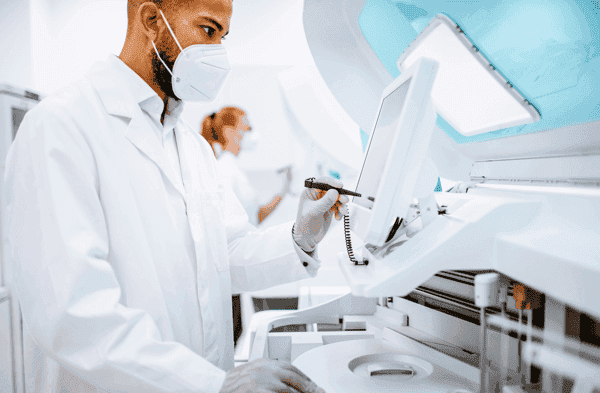WHY PARTICIPATE IN PRECLINICAL RESEARCH?
How a Patient Study Works
Step-by-Step
Step 1: Fill out the Participation Form Complete the online form with your contact and diagnosis information. A Patient Studies specialist will call you in a few days to answer your questions and determine if you meet the initial qualifications for preclinical Patient Studies. Step 2: On-site Screening Appointment During your on-site appointment, a Patient Studies Specialist explains the preclinical studies, options for your participation, and compensation. Preclinical studies require 2-4 visits, depending on the preclinical study.
You will complete a Consent form, which is required before we can talk to you about your condition. Then a Registered Nurse will take you through a basic health history and patient questionnaire. We will draw blood for required lab tests.
Step 3: Study Nurse Phone Call When your screening results are ready, a Study Nurse will call to discuss your eligibility to donate and participation options. If you are eligible and interested in one of the preclinical activities, you will coordinate with a Study Nurse to schedule your donation appointment. Step 4: Biospecimen Donation Appointment A Patient Studies specialist will schedule your donation visit. At your appointment, Study Nurses will work with you to ensure you are comfortable and have a positive experience.
OUR PATIENT DONORS
Frequently Asked Questions
Will I receive experimental drugs or treatment?
Can I keep my physician and current medical care arrangement?
Will I receive compensation?
How will my blood or other biospecimen donation be used?
How many appointments are involved in a study?
What if I have more questions?
Will my personal information and medical condition be kept private?
Protecting You and Your Information
Your physical well-being during the preclinical study is important to us. We will coordinate with your primary care physician and answer any questions or concerns you may have. We are dedicated to keeping your information private and confidential. The information you supply to us will be held on our secure database, your information will not be provided to any third parties, and you can request your information to be removed at any time. Learn more about our Privacy Policy.
Our Patient Studies Leadership
National Medical Director
Lanu Stoddart, MD
For two-and-a-half decades, Lanu Stoddart, MD has been treating patients in blood-based therapeutics and facilitating key research in innovative treatments that are transforming lives. A multi-faceted professional, Dr. Stoddart has experience treating a breadth of diseases including autoimmune disorders, hematologic and infectious diseases, and transplant rejection. She has served in multiple directorships across leading medical institutions in the Northeast and the Southwest; published peer-reviewed research articles across diverse medical topics; and presented at national conferences. Dr. Stoddart also serves as a university educator in health care sciences dedicated to empowering the next generation of scientific leadership that will carry the torch advancing breakthrough medical discoveries. Dr. Stoddart’s expertise in clinical management, transfusion medicine, clinical pathology, and research is reflected in the meticulous oversight she brings to patients’ care in our preclinical studies. Patient advocacy and accessibility to study participants and their personal physicians is a commitment. Her focus on providing a secure and satisfying research experience inspires many of our donors to return for additional study participation. Together with our physicians, physician associates, clinical professionals, and support personnel, Dr. Stoddart ensures excellent care of the patient research champions with whom HemaCare is honored to work. How long have you been involved in treating patients? I have been treating patients in blood-based therapeutics and facilitating key research in innovative diagnostics and treatments for over 20 years. What types of patients have you worked with? I have treated patients with a variety autoimmune disorders, hematologic and infectious diseases, and transplant rejection. What is your leadership experience? I have served in multiple medical directorships in the Northeast and the Southwest at leading medical institutions, published peer-reviewed research articles across diverse medical topics, and presented at national conferences. My work has included resident education, thus empowering the next generation of scientific leadership to advance medical discoveries. My expertise in clinical management, transfusion medicine, clinical pathology, and research is reflected in the oversight I bring to patients’ care in our preclinical studies. As a strong patient advocate, I’m committed to being available to study participants and their personal physicians for questions about our preclinical activities. I work to ensure we provide a secure and satisfying research experience that inspires many of our patient donors to return for additional study participation. Together with our team of physicians, physician associates, clinical professionals, and support personnel, I am honored to provide excellent care to research champions with whom we are honored to work.
Our Patient Studies Team
Our Patient Care Team specialists bring deep experience across nearly every major area of health care, specialized therapeutic intervention, and medical research. Our medical experts include hematology/oncology, bone marrow, and stem cell transplant specialists. Our registered nurses and patient advocates bring decades of knowledge from outpatient and in-patient settings, including oncology, hematology, rheumatology, cardiac care, critical care, tissue donation, transfusion services, and therapeutic apheresis. Our dedicated phlebotomists bring an expert touch to donor care. Our Patient Care Support Team members value and support patient study donors as individuals whose life stories now include a new chapter. Our study participants consistently rate the care they receive as “Excellent”. We look forward to meeting you if you’d like to learn more about helping to advance life-saving treatments.

